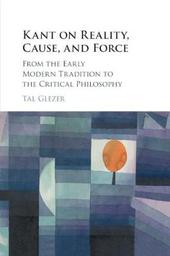
|
Kant on Reality, Cause, and Force: From the Early Modern Tradition to the Critical Philosophy
Paperback / softback
Main Details
| Title |
Kant on Reality, Cause, and Force: From the Early Modern Tradition to the Critical Philosophy
|
| Authors and Contributors |
By (author) Tal Glezer
|
| Physical Properties |
| Format:Paperback / softback | | Pages:241 | | Dimensions(mm): Height 229,Width 150 |
|
| Category/Genre | Western philosophy - c 1600 to c 1900 |
|---|
| ISBN/Barcode |
9781108430777
|
| Classifications | Dewey:193 |
|---|
| Audience | | Professional & Vocational | |
|---|
| Illustrations |
Worked examples or Exercises
|
|
Publishing Details |
| Publisher |
Cambridge University Press
|
| Imprint |
Cambridge University Press
|
| Publication Date |
9 January 2020 |
| Publication Country |
United Kingdom
|
Description
Kant's category of reality is an often overlooked element of his Critique of Pure Reason. Tal Glezer shows that it nevertheless belongs at the core of Kant's mature critical philosophy: it captures an issue that motivated his critical turn, shaped his theory of causation, and established the role of his philosophy of science. Glezer's study traces the roots of Kant's category of reality to early modern debates over the intelligibility of substantial forms, fueled by the tension between the idea of non-extended substances and that of extended objects. This tension influenced Kant's pre-critical work, and eventually inspired his radical break towards transcendental idealism. Glezer explores the importance of reality for Kant's conceptions of cause and force, and sheds new light on his philosophy of physical science, including gravity. His book will interest scholars of Kant and of early modern philosophy, as well as historians of scientific ideas.
Author Biography
Tal Glezer is a researcher at the Max Planck Institute for the History of Science in Berlin.
Reviews'Kant on Reality, Cause, and Force is the first study to give a coherent account of the complex relationship between qualities, causes, and forces in Kant's philosophy by drawing on important strands in early modern philosophy and science. It is a compelling reconstruction of Kant's critical concept of reality, and, with its distinctively non-psychological viewpoint, it makes an original contribution both to Kant scholarship and to the development of early modern metaphysics and philosophy of nature more broadly.' Konstantin Pollok, University of South Carolina
|